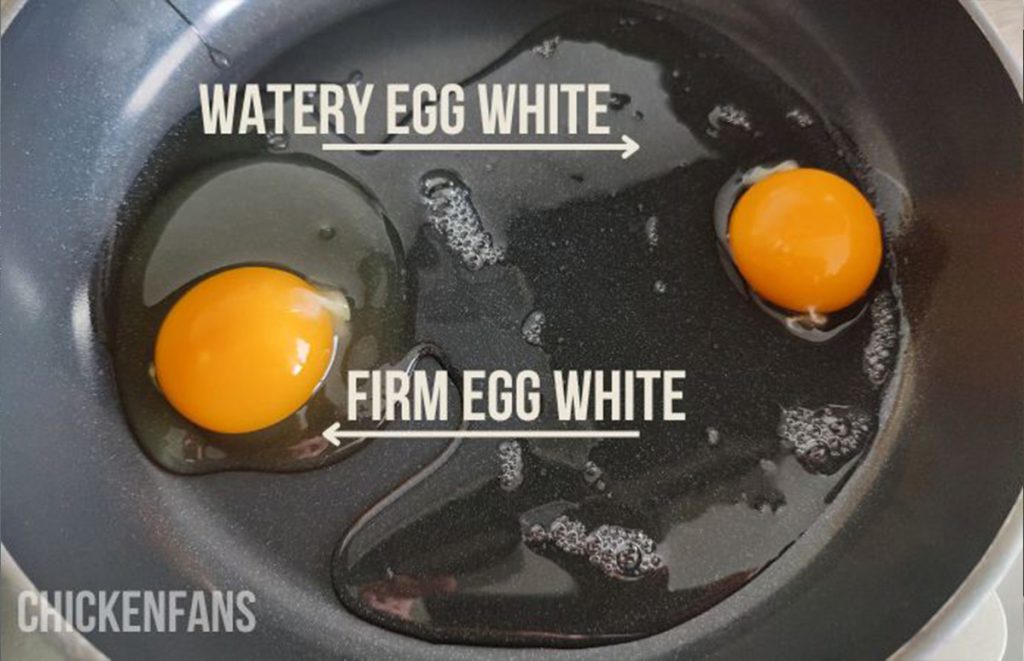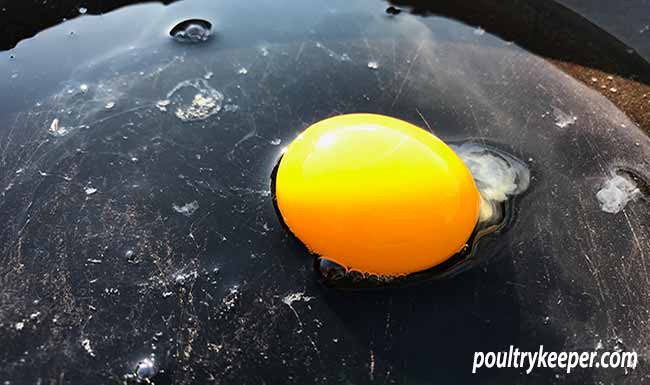As a backyard chicken owner, you love collecting those fresh eggs every morning. But nothing is more disappointing than cracking open an egg only to find the whites are thin and watery.
Watery egg whites can certainly be alarming. You immediately worry if your precious flock is sick or if the eggs are still safe to eat.
While disconcerting, watery eggs are fairly common. In most cases, it’s nothing to be too concerned about.
There are a lot of things that could be causing your chickens to lay watery eggs. Here are some ideas for what you can do.
What Causes Watery Egg Whites?
Before jumping to conclusions, it helps to understand all the possible causes of watery egg whites:
Older Eggs
The pores in the shell of an egg let water out, making the whites thinner as the egg ages.
Storing eggs at room temperature accelerates this process. Refrigeration helps slow it down.
Of course, fresh eggs right out of the coop will have the thickest whites.
Heat Exposure
Heat causes the contents of the egg to expand and places stress on the hen.
Both scenarios can result in a larger air cell and thinner egg whites
Make sure your chicken coop has enough air flow and that your chickens can get shade on really hot days.
Ammonia Exposure
Ammonia fumes from accumulated droppings can irritate a hen’s respiratory tract. This negatively affects her egg laying ability.
When ammonia builds up in the coop, be sure to clean it right away and improve ventilation.
Hen’s Age
As hens mature, their egg quality gradually declines. Older hens tend to lay eggs with thinner whites.
Supplementing their diet with additional calcium can help improve shell and egg quality. But some thinning is inevitable.
Diseases
Certain infectious diseases like bronchitis and egg drop syndrome can result in thin egg whites.
Always monitor your flock for signs of illness and treat any diseases promptly.
Stress
Stress from predators, overcrowding, relocation, molting, etc. can temporarily impact egg quality.
Try to minimize stress by providing a safe and comfortable environment for your chickens.
Poor Nutrition
Eggs often have thin whites when people don’t get enough protein, calcium, and other nutrients that are needed to make eggs.
Provide a complete layer feed and supplement with treats like mealworms.
Genetics
Some breeds are genetically prone to laying eggs with thinner whites. Production breeds tend to have thicker whites.
Choose breeds like Australorps, Orpingtons and Plymouth Rocks if thick whites are a priority.
Are Watery Egg Whites Safe to Eat?
The good news is watery egg whites pose no health risks and are completely safe to eat!
As long as the egg has a clean, uncracked shell, there is minimal risk of contamination or spoilage.
The egg may not whip up or fry as nicely, but the taste, nutrition and cooking properties remain unaffected.
Watery whites are a sign of age, but not spoiled quality. There’s no need to discard them. Simply use them up sooner rather than later.
How to Prevent Watery Egg Whites
While you can’t avoid watery whites altogether, the following tips can help:
- Collect eggs frequently to minimize how long they sit in the nest
- Immediately refrigerate excess eggs you can’t use within 7-10 days
- Cull older hens as their egg quality declines over time
- Keep coop clean and ammonia free
- Ensure adequate ventilation and airflow
- Provide shade, misters and cool treats during heat waves
- Reduce stress by giving them ample space and hiding spots
- Feed a balanced diet rich in calcium and protein
- Choose breeds prone to laying eggs with thick whites
When to Worry About Watery Egg Whites
Watery whites are usually nothing to fret about. But in some cases, it could signal an underlying issue:
- If the problem arises suddenly in younger hens
- If other symptoms accompany it like low production
- If the whites are excessively thin and watery
- If the thin whites persist for weeks
- If the hens show signs of illness
In these instances, take action to identify and remedy the cause. Thin whites accompanied by illness likely indicate disease. Seek veterinary help to properly diagnose and treat the issue.
Monitor for other red flags like drops in appetite, energy and egg production. Isolate any sick birds until they recover.
Rule out diet deficiencies and heat stress. Make improvements where needed.
If the flock checks out as healthy otherwise, thin whites are probably age related. As long as the eggs smell normal, they’re safe to eat.
What To Do With Watery Eggs
While watery whites may not whip up into gorgeous peaks or yield the perfect over easy egg, they still serve up nicely when preparation technique is adjusted. Some creative ways to use them:
- In quiches, casseroles and baked goods where structure isn’t as important
- Scrambled, hard boiled or poached
- As a binder or egg wash when appearance doesn’t matter
- In omelets, frittatas and stir fries
- In smoothies, custards and puddings
- Make pickled eggs
- Hydrate dry kibble for pets
So next time you crack open an egg with thin whites, don’t despair! Rest assured that as long as the egg smells normal, it’s perfectly safe and tasty to eat.
FAQs About Watery Egg Whites
How long do eggs last before getting watery whites?
In ideal storage conditions, eggs can be kept 3-5 weeks before noticeable thinning of the whites. Refrigeration prolongs freshness.
At what age do hens start laying watery eggs?
Egg quality begins gradually declining around 2-3 years old. Older hens past their prime lay eggs with thinner whites.
Do store bought eggs have watery whites?
Store bought eggs are often weeks old, so they tend to have thinner whites than super fresh eggs. Refrigeration helps maintain quality longer.
Can scrambled eggs have watery whites?
Yes, scrambled eggs can still have thin, watery whites. But the changes in texture and viscosity are less noticeable when cooked.
Do thin egg whites affect the taste?
Watery whites pose no difference in flavor or nutrition compared to thick whites. The taste remains unchanged.
The Takeaway on Watery Egg Whites
While startling at first, watery whites are fairly common and nothing to panic over in most cases. They happen as eggs age but don’t indicate spoiled quality.
Rest assured watery eggs are perfectly safe for you eat! Just be sure to use them up sooner rather than later for best results.
Adjust your cooking methods to accommodate the thinner whites. Focus on enjoying those fresh backyard eggs, even with their occasional quirks!

Problems with watery egg whites
Watery egg whites can cause more misshaped, wrinkled egg shells and if combined with thinner shells, can cause eggs to break easily leading to vices such as egg eating because eggs break more easily.

You can test an egg for watery white, simply by cracking an egg onto a flat surface such as a plate and seeing how much it spreads out across the plate (or frying pan in the picture above).
There is actually a measure of how watery eggs are where the height of the white and the weight of the egg are measured to give a measurement in Haugh between 0 and 100. The lower the Haugh value is, the more watery the white is.
This measurement is only normally used in commercial egg production and the minimum value of 60 is usually required when eggs are sold in the shops.
Watery egg whites are safe to eat
Remember that it’s normal for older hens to lay watery egg whites. You can safely eat them as long as they are fresh and the shells don’t have any cracks that bacteria can get into.
Most of our older hens in a back garden set up will lay eggs well below the value of 60 Haugh that is acceptable for shops.
